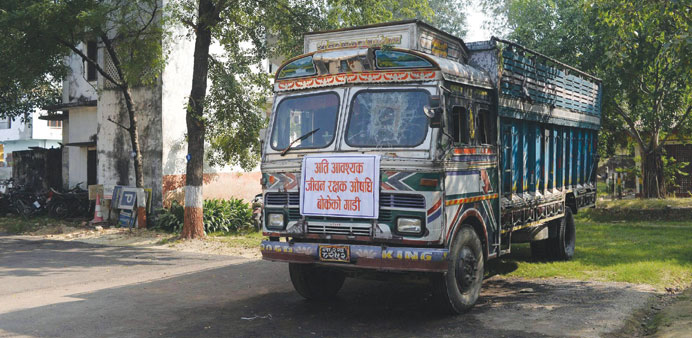A truck carrying medicines, which was torched by protesters, is parked after police doused the fire in Parsa, a Nepalese district bordering India, yesterday.
DPA, AFP/Kathmandu
Protesters in the southern plains of Nepal torched a vehicle carrying medicines yesterday, a local official said, as demonstrators continued their fight against the country’s new constitution.
Medicines worth Rs200,000 ($1,900) were destroyed when protesters in the southern Madhesh region attacked the vehicle, an official from Birganj district said.
On Thursday, Madhesi groups told government representatives that they would step up their protests but would not impede the supply of emergency items such as medicines.
Nepal is heavily dependent on its giant neighbour for fuel and other supplies, but little cargo has crossed the border since protests against a new constitution broke out in late September.
Demonstrators from the Madhesi ethnic minority have been blockading the main Birgunj crossing ever since, protesting a new constitution they say leaves them politically
marginalised.
Movement across other border checkpoints has also slowed to a crawl, prompting fuel rationing and forcing the government to start selling firewood as residents run out of cooking gas.
Who is to blame for all this is a matter of dispute.
Nepal’s government accuses India, which has criticised the new constitution, of retaliating with an “unofficial blockade” — a charge New Delhi denies.
“The issues facing Nepal are political in nature. They are internal to Nepal and the Nepalese leadership has to resolve them through dialogue with agitating parties,” said Indian foreign ministry spokesman Vikas Swarup at a recent briefing.
The Nepal Chemists and Druggists Association say around 350 cargo trucks carrying medicines are stranded at the border.
“We are suffering from a shortage of imported life-saving injections and vaccines,” said Mrigendra Shrestha, president of the association.
“Medicines are crucial. We are now trying to airlift emergency supplies.”
The head of Bir hospital — Nepal’s oldest — said both fuel and vital drugs were running short.
“Operations have become difficult without fuel. If this blockade continues, we will have a medical crisis on our hands,” Swayam Prakash Pandit said.
Landlocked Nepal imports 60% of its medicines, and most of them come from India.
Even those that are locally produced have been affected by the political crisis, which comes just months after a devastating earthquake that killed nearly 9,000 people.
Most of the factories are located along the southern border with India, where protests against the new constitution have been fiercest, and many have been forced to close.
Those that do remain open are struggling with a shortage of raw materials and packaging.
This week, the country’s Shahid Gangalal National Heart Centre reduced its daily surgical procedures by 40% citing a shortage of supplies.
“Our stocks are going down, we had to cut down our operations to continue providing service,” said Dipendra Khadka, the administration chief at the hospital.
Nepal’s Red Cross Society (NRCS) resorted to importing blood bags from China after its supplies were stuck at the border.
“The situation is getting from bad to worse. Our supplies will last two weeks now... this problem needs to be resolved,” said Dibya Raj Poudel, spokesman for NRCS.
The health ministry said it was exploring alternative ways of getting supplies into the country, including by air.
“We have made a list of essential drugs and the minister is coordinating to reroute the medicines,” said spokesman Mahendra Shrestha.
Nepal’s Prime Minister KP Sharma Oli has warned that the blockade is having an impact “several times more than the quake”.
But several rounds of talks between the government and the protesting parties have failed to reach an agreement.
For people like Ghimire, with immediate medical needs, the situation is becoming desperate.
“In between all this, the people are suffering. Won’t anyone take notice?” asked her son.

